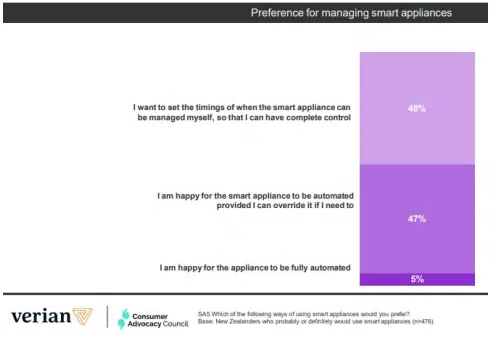This is great research from the Consumer Advocacy Council. What households and businesses think about electrification and their everyday energy choices is THE crucial ingredient in the recipe for successful electrification.
Survey research undertaken in July 2023, sampled 1001 households and 500 small businesses across the country. The results deserve a deep dive, digging into the implications of developing an affordable, reliable, zero-carbon, and flexible electricity market and system.
We will start by scratching the surface and looking at three themes seen in the responses that are relevant to delivering the Flexibility Plan 1.0.
The survey highlights two critical tasks for the electricity ecosystem to make it easier for households to make choices about and maximise the benefits of flexibility and electrification:
Do these things and we should be on our way to developing an affordable, reliable, zerocarbon, and flexible electricity market and system.
We know from Australian research that households do not readily see the additional value that intermediaries (eg, flexibility suppliers or aggregators) could provide beyond what their independently owned flexible resources could give. The issue mostly stemmed from the electricity sector not finding out and understanding things link what households
value, what value they offer, how transparent they were and how easily the information they provided is understood.
No pressure though. Based on what households are saying the electricity ecosystem has until between 2025 and 2028 to be ready to meet their expectations.

Nearly half of households surveyed want to electrify their transport and heating in the next 5-10 years. And over a third want an electric vehicle or solar within the next 12 months.
These household preferences will result in a material expansion of the total flexibility resources available to make the electricity system as affordable and reliable as possible. For this to occur, new capabilities, processes and practices must be developed to take advantage of the opportunity.
The flip side is that these household preferences challenge the legacy operating paradigm. The current markets and systems were not designed to cope with multiple actors and activity and the expected volumes of electricity use at the fringes. Not moving fast enough will result in the electricity system being less affordable, less reliable and will prevent households from doing what they want to do.
Households want to electrify for three very good reasons – they say they want more affordable, more reliable and more zero-carbon energy.

Into this mix, households also expect to be using more electricity in the next 5-10 years. Almost 75% think someone will be at home most days, and about a third of households anticipate using more heating or cooling in the next 5-10 years, e.g., refrigeration (37%), air-conditioning (35%), or home heating (34%).
Some of this extra electricity will have a positive effect on household costs due to the electrification of more expensive fossil-fuel uses such as transport. However, the survey suggests people anticipate using more electricity over and above these substitution effects. If this happens, it might strengthen the motivation to find ways to make
electricity more affordable.
The survey found quite a few households have experienced power outages, with 44% experiencing an unplanned outage in the past 12 months. This may be a one-off result reflecting the severe weather in Auckland in January 2023 and the effects of Cyclone Gabrielle (33% of the survey sample was from Auckland; 3% from Hawkes Bay). It will be interesting to see if the experience or expectation of more frequent severe weather events results in households making choices to ensure a reliable power supply, e.g, by investing in solar and battery storage.
Rooftop solar, EVs and EV chargers, battery storage, water heating, space heating and cooling and other devices and appliances in homes can all be flexible.
First and foremost, flexible resources enable individual households to reduce their energy costs, have a more reliable and resilient power supply and reduce their carbon emissions.
Increasing numbers of households will have flexible resources and are interested in using them. The survey responses make this clear with a majority (71%) of households interested in new technologies that enable flexibility to help manage power bills as well as reliability and emissions.
There is an opportunity to make sure the frameworks and functionality are in place to integrate this latent flexibility resource into the electricity supply chain to benefit wider society and the economy, but without upsetting or bothering the owner. Doing this will contribute to a cost effective, reliable and sustainable electricity network and system.
The survey suggests the electricity ecosystem has work to do for everyone to realise the opportunity of flexibility. There’s a big gap between what people would like to do and putting that into practice.…fewer than half (43%) of households think of themselves as an "early adopter" of new technologies.
Lots of households want flexible devices for affordability, reliability, lower
emissions, but haven’t purchased them yet….14% have a home energy management system, 9% have rooftop solar, 7% have a battery, 3% have an EV. Smart plugs and switches – a ‘basic’ and more accessible source of flexibility – are used by 12% of households (and owned, but not used by a further 11%).
A big reason people are not accessing the benefits of flexibility is inconvenience and hassle.
This suggests people either lack the technology to make things easy or are not using it. And even then, 38% of households would prefer to avoid or minimise the use of automated appliances and devices in the home.
For example, when it comes to charging electrical devices, 42% say they care about whether their devices are charged or not and think less about when they charge them. Same goes for heat pumps and large appliances – typical household patterns show people use them when they use them. Comfort is important, and often people aren’t so keen to change when they heat their home.
Households with time-of-use electricity pricing plans are more likely compared to those on flat pricing to heat their house during the day (15% v 8%) or charge devices in ‘offpeak’ times (35% v 28%) and more likely to use household appliances overnight (30% v 22%).
It would be useful to understand if these households shift their electricity use due to the time-of-use plans or the response is a happy alignment of circumstances and ‘benefit’.

Changing household routines and practices needs to be worth it and many households do not know if there is a financial payoff from being flexible.
The survey found 27% of households do not know the details of their electricity pricing plan and 41% use a flat rate electricity pricing plan (ie, same $/kWh rate all day every day). Given the electricity sector is putting great stock in pricing signals, this highlights an opportunity to provide people with information about time of use plans and the
benefits of flexible electricity use. But, it would be useful to know more about what gets people thinking about their electricity pricing plan before leaping to any conclusions or solutions.
It is possible people do think about using electricity at different times but conclude doing so is not worth it. Half of the households saying it would be hard to use appliances ‘offpeak’ (23% of those surveyed) said they would shift their electricity use if they received a discount. Half said the discount would need to be $150 or more.
It is possible that – using the electricity sector-centric language – encouraging households to shift their electricity use from ‘peak’ to ‘off-peak’ will rely on making it both easier and of more value than it is now. It will be necessary to ensure households have both the information and tools they need to make it happen.
A common electricity sector view is that making it easy means households letting an external party access and manage the flexibility of their appliances. But it pays to bear in mind that 48% of households would want complete control to decide when the appliances are used. Only 5% are happy for the appliance to be fully automated and for the external party to have full access and control over when and how the appliance is operated.
Households appear wary of ceding control. Discovering the reasons for this wariness and investigating appropriate confidence building measures is essential. Households need more information to understand the benefits they can realise from outsourcing control of their flexible resources.
The Consumer Advocacy Council said… ‘These findings highlight the importance of understanding the electricity needs of households and small businesses as the country makes the switch to renewables.’
We agree.
Flexibility Plan 1.0 sets out the FlexForum view of the steps needed for households, businesses and communities to maximise the value of flexible resources both for themselves and for the wider economy. The Consumer Advocacy Council findings reinforce the importance and urgency of coordinated and collaborative action by the
electricity ecosystem to deliver the Plan.
Check out the survey for yourself here: Consumer behaviour survey 2023. We are keen to see what the next round of research says.
Get in touch at info@flexforum.nz to share your perspective.
Is the experience or expectation of more frequent severe weather events causing households to be more interested in solar and battery storage to ensure a reliable power supply?
For households with that shift their electricity use based on a time-of-use plans, was the response caused by the pricing plan or was the response a happy alignment of circumstances and ‘benefit’?
What gets people thinking about their electricity pricing plan?
How much flexibility might turn up based on the indicative value on the table available to flexible households?
Would more households be flexible – using the electricity sector-centric language – by shifting their electricity use from ‘peak’ to ‘off-peak’ if there were tools available to make it easier? And what are those tools?
What are the reasons most households would prefer not to allow a power company to manage their appliances to run at off-peak times when electricity is cheaper?
Are there confidence building measures that could encourage households to realise greater
benefits from their flexible resources?
